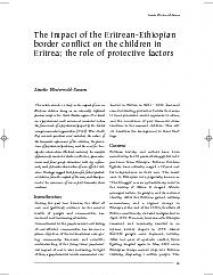The impact of the Eritrean-Ethiopian border conflict on the children in Eritrea; the role of protective factors
This article describes a study on the impact ofwar on Eritrean children living in an internally displaced persons camp in the Gash Barka region.. It is based on a psychosocial needs assessment conducted within the framework of a psychosocial project by the Dutch non-governmental organisation (NGO) ‘War Child,’. Key research questions used included; the nature of the traumatic experiences of the children, the prevalence of psychosocial problems, and the need for therapeutic intervention. Methods included; the analysis of previously conducted studies in Eritrea, open interviews and focus group discussions with key informants, and systematic observation of war-affected children. Findings suggest that powerful factors protected children from the impact of the war, and thus prevented the occurrence of severe post traumatic stress reactions.
Geachte bezoeker,
De informatie die u nu opvraagt, kan door psychotraumanet niet aan u worden getoond. Dit kan verschillende redenen hebben,
waarvan (bescherming van het) auteursrecht de meeste voorkomende is. Wanneer het mogelijk is om u door te verwijzen naar de bron
van deze informatie, dan ziet u hier onder een link naar die plek.
Als er geen link staat, kunt u contact opnemen met de bibliotheek,
die u verder op weg kan helpen.
Met vriendelijke groet,
Het psychotraumanet-team.
In: Intervention: the international journal of mental health, psychosocial work and counselling in areas of armed conflict, ISSN 1571-8883 | 3 | 1 | 25-30
https://journals.lww.com/invn/abstract/2005/03010/the_impact_of_the_eritrean_ethiopian_border.3.aspx


